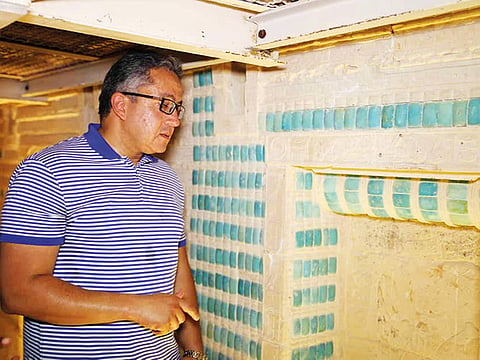Fresh antiquities to boost Egypt’s lagging tourism
A plethora of new archaeological finds set to lure back foreign visitors

Cairo: Egypt will unveil, in the coming months, a string of archaeological discoveries set to boost the country’s ailing tourism sector, officials said.
Egyptian Antiquities Minister Khalid Al Enany has promised a season “full” of archaeological finds and reopening of restored monuments.
Last week, Al Enany inaugurated an ancient tomb noted for its vivid colours in the Saqqara necropolis south of Cairo. The tomb of Mehu, a top official in Pharaonic Egypt’s Old Kingdom, was unearthed in 1940 but was opened to the public only on Saturday after extensive restoration works.
“With the inauguration of the Mehu tomb, we declare the start of the archaeological season that will witness a large number of inaugurations,” Al Enani said at a press conference on Saturday.
“This year will see three major discoveries in three different governorates,” he added, without giving details.
The minister disclosed that the restoration of the step Zoser Pyramid in Giza will be completed by early 2019. The pyramid is the world’s oldest surviving stone monument, dating from 27th century BC.
Al Enany made the announcements while touring several sites being renovated in Saqqara. Foreign diplomats in Cairo joined the tour.
Discovering stability
In recent months, Egypt uncovered several ancient structures in Cairo, Luxor and the Nile Delta, including mammoth statues and graves. Authorities are also building a major museum near the Giza pyramids. Egypt plans to showcase some of its most famous ancient artefacts, including those of the boy king Tutankhamoun at the new museum, in an effort to lure more foreign visitors.
“Egypt has an unrivalled wealth of antiquities that belong to different eras,” said Hassan Al Sharif, a tourism expert. “Almost no month passes without a new discovery. The new finds enrich this wealth and provide positive publicity for Egypt in the foreign media,” he told Gulf News.
Al Sharif expected that the initial opening of the Grand Egyptian Museum — scheduled for early 2019 — will further enhance Egypt’s allure.
“A large collection of ancient pieces will be exhibited in the new museum. Visitors will see for themselves how far Egypt has become stable.”
Egypt has experienced a spate of militant attacks after the army’s 2013 ouster of Islamist president Mohammad Mursi, following enormous street protests against his rule.
Since taking office in mid-2014, incumbent President Abdul Fattah Al Sissi has largely re-established stability in Egypt.
Once a major foreign currency earner for Egypt, the tourism industry bore the brunt of the upheavals that followed the ouster of president Hosni Mubarak in 2011.
In October, 2015, tourism suffered a new hard blow when a Russian passenger plane crashed in Sinai shortly after its departure from the popular resort of Sharm Al Shaikh.
All 224 people on board were killed. Russia said the jet had been brought down by a terrorist bomb and halted all flights to Egypt. Daesh claimed responsibility for the alleged bombing.
In recent months, tourism has shown signs of recovery. Earlier this year, Russia restarted its flights to Cairo. Egyptians are pushing for the resumption of Russian flights to the country’s popular holiday destinations of Sharm Al Shaikh and Hurghada.
Last year, some 8.6 million foreign tourists visited Egypt, an increase of more than 55 per cent against 2016, according to official figures.
Some parliamentarians are confident that the Egyptian tourism is recovering well. “Egypt is able to set records in numbers of foreign visitors in light of the stability the country is enjoying and the political leadership’s interest in supporting the tourism industry,” said Ahmad Samih, member of the parliament’s tourism committee. “The inauguration of the Grand Museum will be a great opportunity to attract world attention, as the museum will present an impressive view of Egyptian civilisation,” he said.
A record 15 million people visited Egypt in 2010, the year before the anti-Mubarak uprising.
Sign up for the Daily Briefing
Get the latest news and updates straight to your inbox



